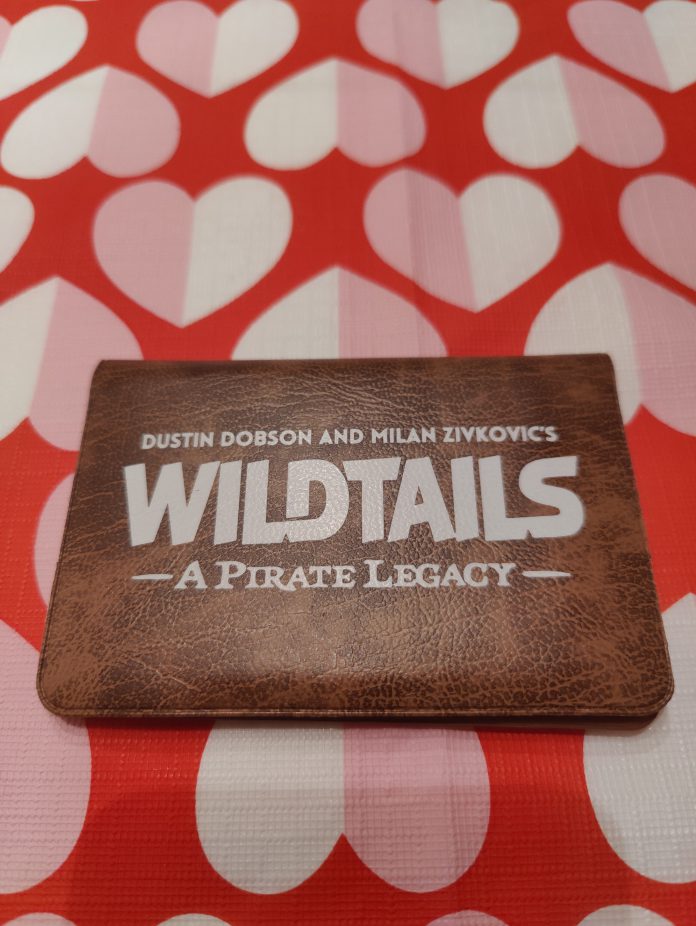When we received our package of games from Buttonshy, I didn’t quite know what to expect from either wallet sized game. What I discovered is that looks can be incredibly deceiving.
Battlecrest really surprised me by delivering a compelling skirmish game in a small package. Wildtails, pitched as a pirate themed legacy game in a single wallet sized envelope, felt like it had a far larger quest to convince me that it could deliver an enjoyable legacy experience in such a small package. There are a lot of things that are very attractive about the idea of a fully fledged legacy game in the smallest package possible, especially as legacy games often come in huge boxes filled with stickers, minis, tearable documents, and more, making them huge, clunky, space and time consuming games. Could Wildtails really give me the full legacy experience, and even if it could, could it do so in a way that was enjoyable?
Well…let’s chat about legacies for a bit, first.
Better to Live in Infamy?
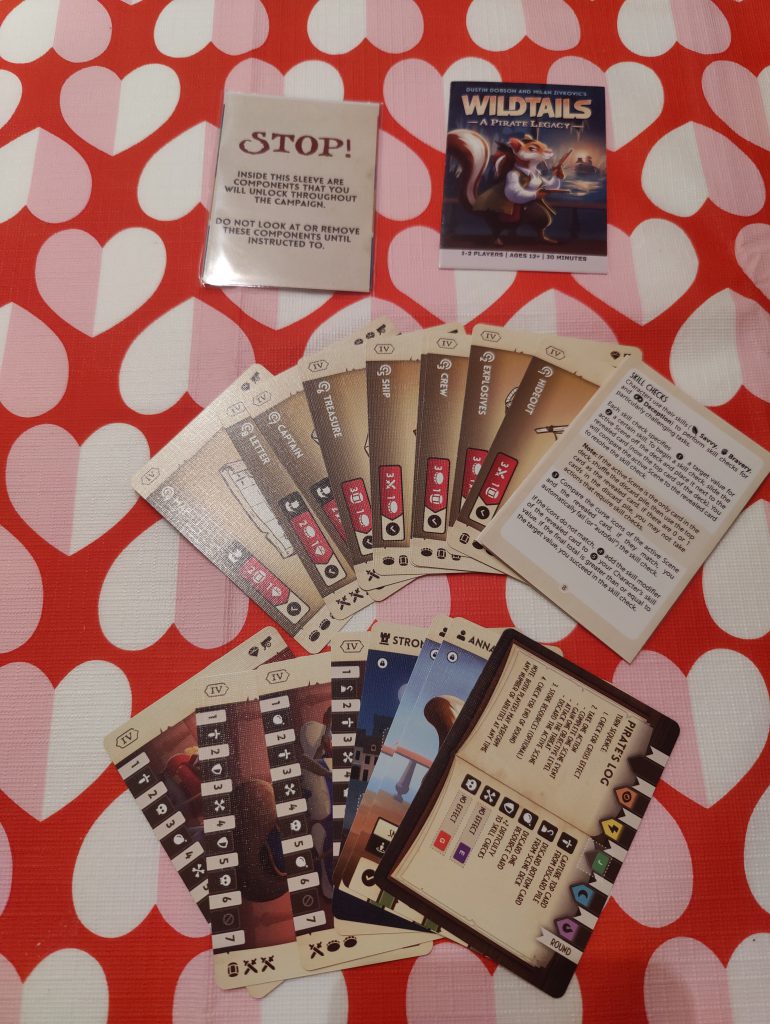
Legacy games were quite the rage a few years ago, before the pandemic reared its head and took everyone from playing games in groups to finding abstracted ways to even engage with board games at all. Via expansive campaigns in which you made permanent changes to the board and components, legacy games nothing would ever be the same again You’d also have a weird, sort of not functioning board game at the end of it that also generally cost you 100 dollars. But the experience! Oh, the experience.
Truth be told, readers, I’m not really a big fan of legacy games. In fact, I’ve reviewed one before, Clank! Legacy, and it is so far the gold standard for me in terms of Legacy games, but also one of the few I’ve actually liked. This mostly stems from the fact that it leaves you with a working, unique copy of Clank! at the end of the campaign, but even that hasn’t meant much. My group moved on, and so did I, and so even though we had our ‘unique’ copy, we really just never went back to it.
Legacy games promise a lot but rarely deliver. The biggest thing I’ve always found, though, is that what they don’t deliver on is the thing I’m looking for the most. I don’t particularly think Legacy games work best when they have me tearing up components and destroying my game, forever locking me in to some choice I made or consequence I encountered forever. Instead, I think Legacy games work best when they provide continued, linked experiences and weave a narrative that combines play and flavor, where the narrative arcs of both the story and the mechanics link up in a satisfying way.
Even Clank!, for all that I love about it, creates a very odd state of things in which the game encourages co-operative-ish play, despite Clank! Being a competitive game. Playing Clank! Legacy competitively hurts the overall game, but playing Clank! Co-operatively makes the game feel very strange when a player has a very bad set of outcomes, most of which come from the actions of others.
So, with Wildtails promising a legacy experience in 18 cards, I had to at least see if it could deliver on any sort of promise of a legacy title at all, whether good or bad.
High Seas, Low Stakes
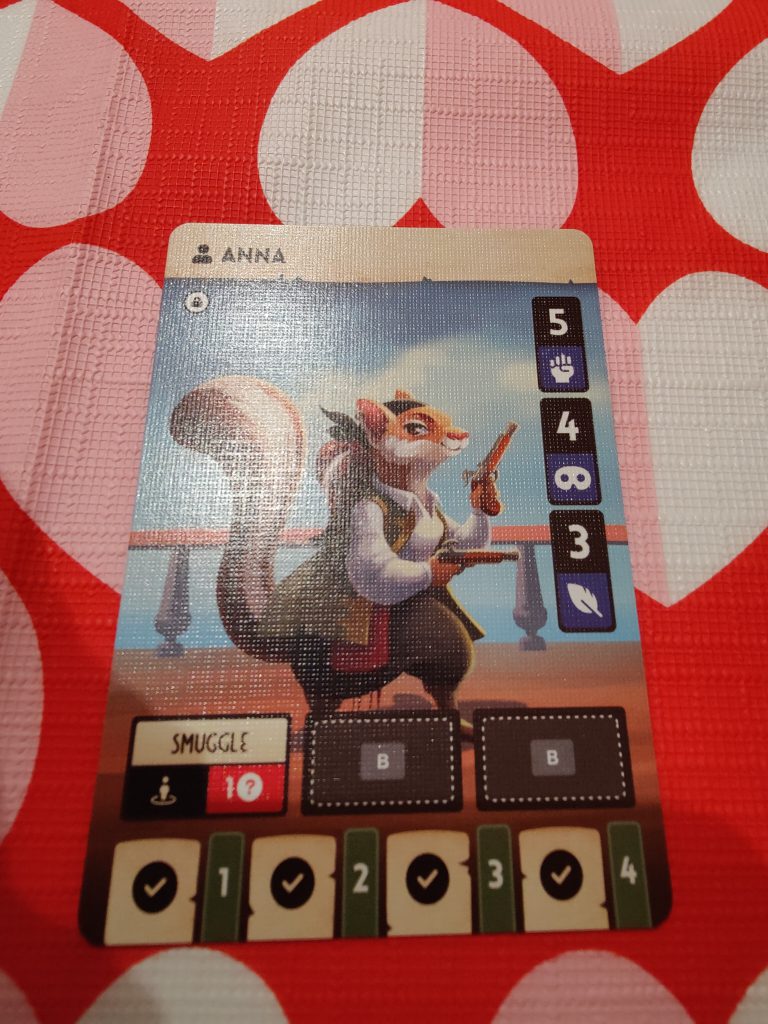
Wildtails presents an experience for 1-2 players, but I honestly did not find the two player aspect either detrimental or helpful to my experience with the game. Infact, I think the game just works best played solo, even if that means you are ‘two-fisting’ the game, but only because it allows you to prioritize the choices that you need to make and how to approach the challenges of the game itself.
One of the things that Wildtails shares in common with Battlecrest is that you don’t need anything other than the cards that come in the envelope: no dice, no coins, no tokens, everything is controlled by and functions through the cards themselves. The 18 cards mentioned are, quite literally, everything you’re going to use. The game also comes with a few stickers, and nothing is destructible, meaning that this is actually a legacy game you can replay, if you like, or simply restore and hand off to someone else.
The biggest downside, however, is that there is slight internet usage required, as a website guides you in terms of how to set things up, what sorts of outcomes you’ll get, and how to progress through things. This isn’t a dealbreaker, but do know that you will need some form of brief internet access to get the various scenarios set up and know what happens based on the outcomes of those scenarios.
Really, I was shocked at how much fun I had with Wildtails. Because of the soloable element, it also made this the ‘travel’ game than I was kind of hoping for initially with Battlecrest: a small game with a big impact that I can easily transport and use to keep myself entertained. Also, Wildtails does what Battlecrest could not: use small amounts of table space. I found that Wildtails easily fit on a very small surface, and could easily be played in a cafe setting or other small space area where one might be relaxing and looking for something to do or entertain oneself. This was perhaps the most refreshing part of the game for me, in the sense that I could easily take the game with me, and, even with needing to check a website on my phone first, set up and play a fairly challenging and compelling game in a quick amount of time, with minimal set-up and teardown.
Gaining Your Sea Legs
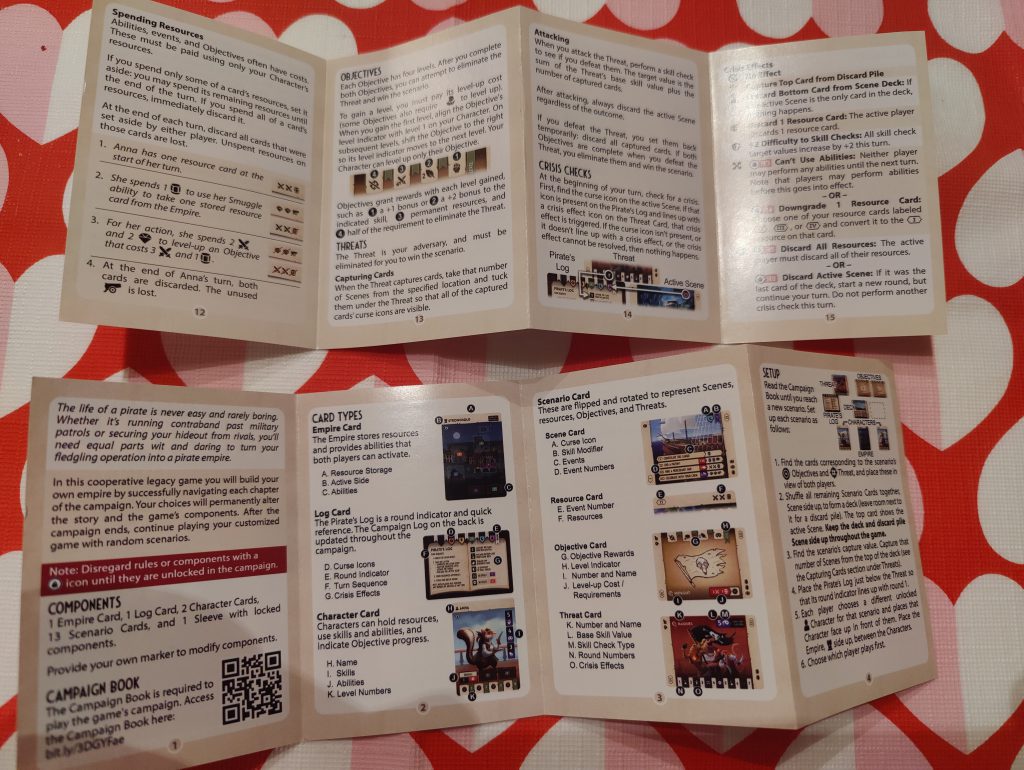
The story in Wildtails is a fairly simple but fun little tale of piracy, set in the war of 1812. The historical setting kind of threw me off at first, not because of the use of anthropomorphic animals, but mostly just because it actually tries to use real historical events for a game about pirates, without really engaging with anything that might truly involve. Still, the game tells a fun story, and the way it plays out with the use of the website helps keep things moving.
The game doesn’t particularly do much with the pirate theme, though. You don’t really engage with sea battles or things pirates would normally do, and instead the game focuses a bit more on the swashbuckling and fighting aspect of this setting over anything else. I will say that this might sound like nitpicking, but really, it just is to mention that despite the specific historical setting, I never felt very much like I was, well, being a pirate. Still, I did feel like I was going on an adventure, and that probably matters quite a bit more than anything else.
What I also felt like is that I was able to easily explain the game to other people. This is where the benefit of the 1-2 player aspect comes in. You can easily teach Wildtails to a second player, or even teach another person how to play the game before handing them your copy and letting them experience it. This, to me, felt like the actual culmination of Buttonshy’s design philosophy: a small, quick, snappy game that I can easily transport, store, or offload to another person once I’m done with it. I love Wildtails enough to keep it in my collection, and part of that comes from the fact that it takes up literally no space in my home. And if I ever did decide I wanted to divest from the game, I could easily just hand the envelope to someone and say “let me know if you have any questions” and feel great about it.
Plundering Your Lunchtime
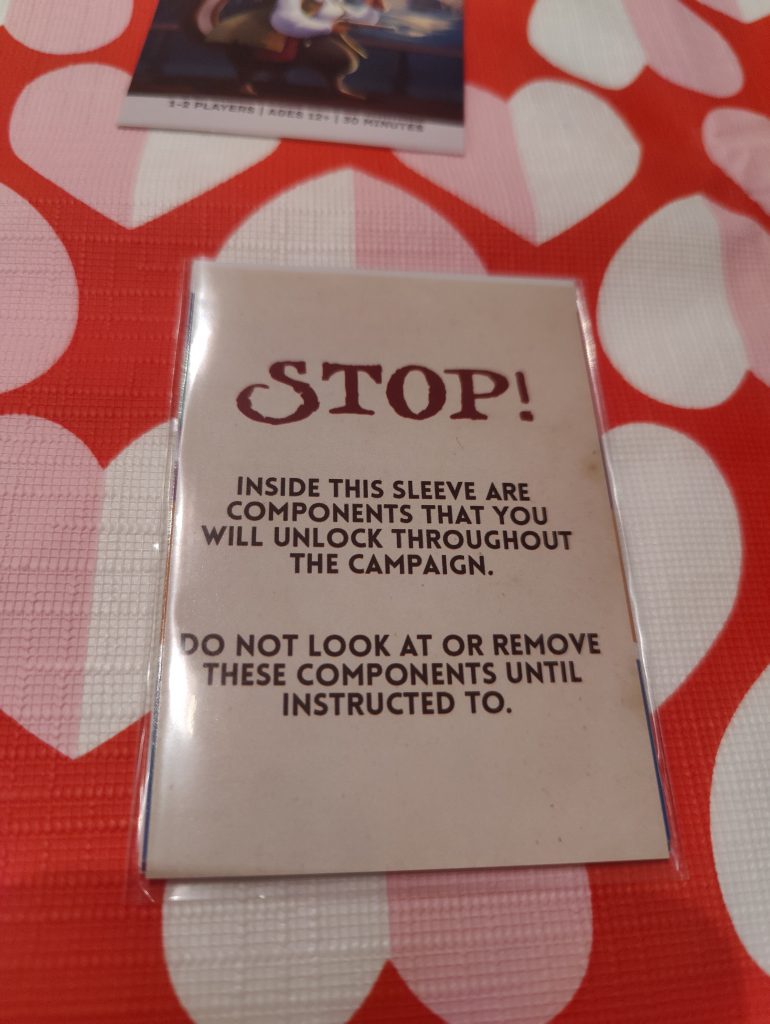
Wildtails is a great little game. Of the two Buttonshy games I was able to play, I really loved my time with this title. I enjoyed the legacy aspects, which were just enough to feel like the outcomes of what happened in my sessions mattered and gave me incentive to even try the game another time to see what would happen differently. I also liked that the legacy aspects are easily reversible, meaning that giving the game to someone else wouldn’t be handing them a destroyed or heavily proxied experience. Even for myself, I like the fact that I can pack up Wildtails and play it again some other time, and make new choices without worrying about having thrown away something or tearing something in half.
I think what I most like about this game is that it shows great promise for what a “legacy” game can do. They don’t have to be huge, they don’t have to be “Epic”, they just need to provide good investments that move the experience along, changing slightly with each play. I really appreciated what Wildtails was doing, and I am excited to see if Buttonshy turns this concept into a series or tries to publish more legacy titles in this vein. I would absolutely recommend Wildtails to solo gamers, especially, as the game really scratched an itch I had been looking to fulfill for some time.
